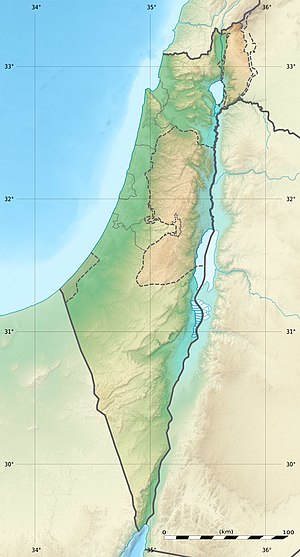
Back معركة جبل طابور Arabic معركة جبل طابور ARZ Schlacht am Berg Tabor German Μάχη του Όρους Θαβώρ (1799) Greek Batalo de Monto Tabor Esperanto Batalla del Monte Tabor Spanish Taborin taistelu Finnish Bataille du Mont-Thabor French קרב תבור HE Թաբոր լեռան ճակատամարտ Armenian
| Battle of Mount Tabor | |||||||
|---|---|---|---|---|---|---|---|
| Part of the French Campaign in Egypt and Syria during the War of the Second Coalition | |||||||
 Battle of Mount Tabor by Louis-François Lejeune | |||||||
| |||||||
| Belligerents | |||||||
|
| |||||||
| Commanders and leaders | |||||||
|
|
| ||||||
| Strength | |||||||
| 4,000[2] (at the end, after Bonaparte's 2,500 men arrived)[3] | 35,000[3] | ||||||
| Casualties and losses | |||||||
|
2 killed 60 wounded[4][5] |
6,000 killed 500 captured[6] | ||||||
Location within Mediterranean | |||||||

The Battle of Mount Tabor was fought on 16 April 1799, between French forces commanded by Napoleon Bonaparte and General Jean-Baptiste Kléber, against an Ottoman Army under Abdullah Pasha al-Azm, ruler of Damascus. The battle was a consequence of the siege of Acre, in the later stages of the French Campaign in Egypt and Syria.
Upon hearing that a Turkish and Mamluk army had been sent from Damascus to Acre, for the purpose of forcing the French to raise the siege of Acre, General Bonaparte sent out detachments to track it down. General Kléber led an advance guard and boldly decided to engage the much larger Turkish army of 35,000 men near Mount Tabor, managing to hold it off until Napoleon drove General Louis André Bon’s division of 2,000 men in a circling manoeuvre and took the Turks completely by surprise in their rear.
The resulting battle saw the outnumbered French force inflict thousands of casualties and scatter the remaining forces of the pasha of Damascus, forcing them to abandon their hopes of reconquering Egypt and leaving Napoleon free to carry on the siege of Acre.[7]
- ^ a b Strathern 2008, p. 351.
- ^ River 2018.
- ^ a b Smith, D. p. 151
- ^ Laurens 1996.
- ^ Bonaparte et l'Égypte: feu et lumières p. 117
- ^ Bonaparte et l'Égypte: feu et lumières p. 117
- ^ Strathern 2008, p. 349.
© MMXXIII Rich X Search. We shall prevail. All rights reserved. Rich X Search


